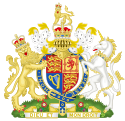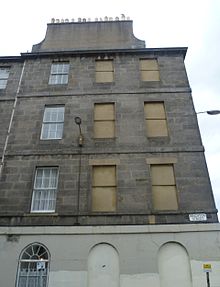- Window tax
-
Taxation in the United Kingdom 
This article is part of the series:
Politics and government of
the United KingdomCentral government HM Treasury
HM Revenue and Customs
Income tax · PAYE
VAT · National Insurance
Corporation tax
Inheritance tax · Stamp duty
Capital gains tax · Excise tax
Motoring taxesLocal government Council Tax · Rates · Business rates Taxation by country- Australia
British Virgin Islands
Canada · China
Colombia · France
Germany · Hong Kong
India · Indonesia
Ireland · Netherlands
New Zealand · Peru
Russia · Singapore
Switzerland · Tanzania
United Kingdom
United States
European Union -
Tax rates around the world
Tax revenue as % of GDP -
• project The window tax was a significant social, cultural, and architectural force in England, France and Scotland during the 18th and 19th centuries. Some houses from the period can be seen to have bricked-up window-spaces (ready to be glazed at a later date), as a result of the tax.
Contents
Details
 A house in Portland Street, Southampton
A house in Portland Street, Southampton
The tax was introduced in England and Wales under the Act of Making Good the Deficiency of the Clipped Money in 1696 under King William III[1] and was designed to impose tax relative to the prosperity of the taxpayer, but without the controversy that then surrounded the idea of income tax. At that time, many people in Britain opposed income tax, on principle, because they believed that the disclosure of personal income represented an unacceptable governmental intrusion into private matters, and a potential threat to personal liberty.[2] In fact the first permanent British income tax was not introduced until 1842, and the issue remained intensely controversial well into the 20th century.[3]
When the window tax was introduced, it consisted of two parts: a flat-rate house tax of 2 shillings per house (£11.12 as of 2011),[4] and a variable tax for the number of windows above ten windows in the house. Properties with between ten and twenty windows paid a total of four shillings (£22.25 as of 2011),[4], and those above twenty windows paid eight shillings(£44.5 as of 2011),[4]. The number of windows that incurred tax was changed to seven in 1766 and eight in 1825. The flat-rate tax was changed to a variable rate, dependent on the property value, in 1778. People who were exempt from paying church or poor rates, for reasons of poverty, were exempt from the window tax.[5] Window tax was relatively unintrusive and easy to assess. The bigger the house, the more windows it was likely to have, and the more tax the occupants would pay. Nevertheless, the tax was unpopular, because it was seen by some as a tax on "light and air".[6]
In Scotland a Window Tax was imposed after 1748. A house had to have at least seven windows or a rent of at least £5 to be taxed.[7]
A similar tax existed in France from 1798 to 1926, the Doors And Windows Tax.[8]
There was a strong agitation in England in favour of the abolition of the tax during the winter of 1850-1851, and it was accordingly repealed on the 24th July 1851, and a tax on inhabited houses substituted.[9]
Daylight robbery
"Daylight robbery" redirects here. For other uses, see Daylight Robbery (disambiguation).Some allege that the term "daylight robbery" originated from this tax.[who?] However, according to the Oxford English Dictionary, the phrase daylight robbery was first recorded in 1949, many years after the "window tax", which places doubt upon the claim.[10][11] However, the phrase originates from at least 1916, when it was mentioned in Harold Brighouse’s play Hobson's Choice,[12] and it should be remembered that the Oxford English Dictionary only records the first provable written instance of the phrase that its etymologists can find, so the phrase might have been used in everyday speech beforehand, or even in published writing.[13]
See also
- Brick tax
- Wallpaper tax
References
- ^ Herber, Mark D (1997). Ancestral Trails: The complete guide to British genealogy and family history. Sutton Publishing Ltd. ISBN 0-7509-1418-1. p.416
- ^ John Stuart Mill, Principles of Political Economy (1848), Bk. V, Ch. 3, Section 5
- ^ HM Revenue & Customs "Nicholas Vansittart was Chancellor when Napoleon was defeated [in 1815]. His inclination was to maintain some tax on income, but public sentiment and the opposition were against him. A year after Waterloo, income tax was repealed ‘with a thundering peal of applause’ and Parliament decided that all documents connected with it should be collected, cut into pieces and pulped."
- ^ a b c UK CPI inflation numbers based on data available from Lawrence H. Officer (2010) "What Were the UK Earnings and Prices Then?" MeasuringWorth.
- ^ Herber p.416
- ^ Request for window tax exemption, 1765
- ^ National Archives of Scotland: Guide to taxation records.
- ^ Full text of the law at French Wikisource
- ^ Encyclopedia Britannica (1911), volume 28, page 713.
- ^ World Wide Words: Daylight robbery
- ^ Take Our Word For It, the weekly word-origin webzine
- ^ Hobson's Choice by Harold Brighouse Project Gutenberg
- ^ BBC - History - More about One Sandwich Short of a Picnic
Categories:- Taxation in the United Kingdom
- Georgian era
- Stuart England
- Stuart Scotland
- Taxation in Scotland
- Legal history of the United Kingdom
- English architecture
- Scottish architecture
- 1696 establishments in England
- 1748 establishments in Scotland
- Taxation in France
- Australia
Wikimedia Foundation. 2010.

